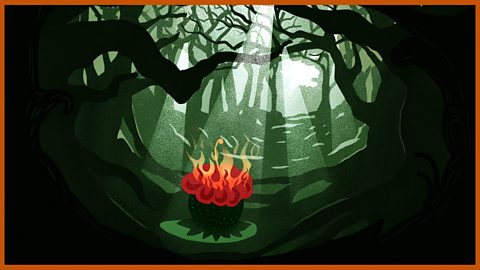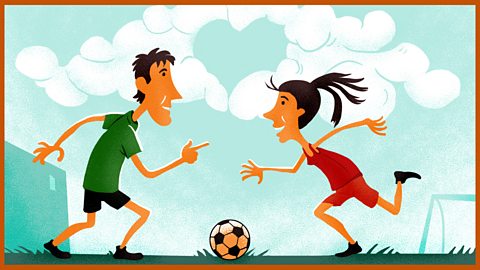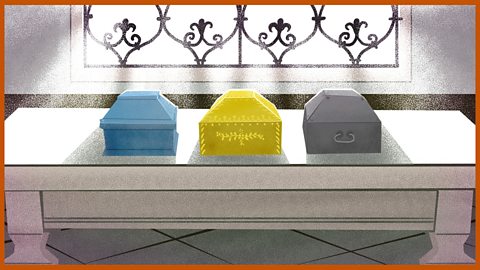Henry V - A Soldier's Tale: a short story inspired by Henry V written by Geraldine McCaughrean. Read by David Gyasi.
Synopsis
Henry V is Shakespeare’s famed history play. This version of the story is told by Pistol – one of the comic characters in Shakespeare’s play. Pistol takes on the role of the original play’s Chorus - he even mirrors some of the Chorus’s most famous lines - by inviting us, as listeners, to imagine great courts, armies and battlefields. Pistol explains all about Henry’s mischievous youth, his kingship and his decision to fight in France. We learn about the invasion and Harfleur and Pistol gives us echoes of Henry’s famously rousing St Crispin’s Day Speech before the Battle of Agincourt. Pistol comes across as a lovable rogue, but there is a real sense of pathos in his re-telling. He wants us to know of the vain-glorious futility of war; despite the victory in France, his friends are dead and he can’t get a living now that he is back in England…

Interview with writer Geraldine McCaughrean
Ã˝
Ideas for use in the classroom
History
October 2015 saw the 600th anniversary of the Battle of Agincourt. Children could research the battle and find out how similar it is to Shakespeare’s version. When Henry reads out the list of the dead after Agincourt he says that there are ten thousand French dead but only a handful of English dead. Read the following text to the children, numbering the English dead.Edward the Duke of York, the Earl of Suffolk,
Sir Richard Ketly, Davy Gam, esquire:
None else of name; and of all other men
But five and twenty. O God, thy arm was here
Children could find out how accurate these figures are thought to be. They could research why the French were unsuccessful, despite outnumbering the English. (Note: the French cavalry charge was thought to be hindered by the thick clay soil and the English army’s longbows. Many horses lost footing and the French were crushed in the charge). Question: Why might Shakespeare play down the number of English dead in his play? Think about who his audience were. Question: Do you think that this play is often performed in France? Why?
Art - imagining courts, armies and battles
Pistol repeatedly asks his listeners to use their imagination to create pictures in their minds. This is exactly what the Chorus does inShakespeare’s play – asking the audience to become active participants in the drama by using their imaginations. Share this link to the original play with the children. Give them the Chorus’s original line, ‘Think when we talk of horses that you see them’. Now, ask the children to listen to the broadcast again and this time allow pictures to form in their minds of the scenes that Pistol describes. They can create their own artwork based on the story. Explain that, just as Shakespeare wanted, they are becoming active participants in the story. Create a gallery of their Henry V artwork; they will undoubtedly focus on different aspects of the story - the romance, the battles and perhaps portraits of Pistol himself.
History/PSHE - war veterans
In Henry’s speech at Agincourt, he tells the men that they are a ‘Band of Brothers’
This story shall the good man teach his son;
And Crispin Crispian shall ne'er go by,
From this day to the ending of the world,
But we in it shall be remember'd;
We few, we happy few, we band of brothers;
How do we remember our war heroes? Why is it important to do this? This could be linked to topic work on the Second World War. Children could carry out research relating to WW2 and more recent conflicts and create their own ‘remembrance’ tributes; poems, posters etc.
English – Henry and Pistol’s characters
Question: Is Pistol a reliable narrator? Children could create a character profile/ role on the wall from the clues given about Pistolin the re-telling. What clues do we get that he is not ‘Fierce as lions and brave as bears’ as he first suggests?
Question: Was Henry right to become a solemn king and give up his ‘harum scarum’ friends? Pistol even tells us that Henry arranges for two of his old friends to be hanged during the French war. Children could create a balanced argument about the responsibilities of kingship versus Henry’s responsibility to his friends.
See Teachers' notes below for more ideas

Ã˝
Ã˝
More from this series
A Midsummer Camp's Dream. audio
Laura Dockrill retells the story of A Midsummer Night's Dream. Read by Shirley Henderson.

Romeo v Juliet. audio
A Chris Priestley story inspired by Romeo and Juliet. Read by Sarah Macdonald Hughes.

All for a pound of flesh. audio
A short story by Jamila Gavin, inspired by The Merchant of Venice. Read by Jez Edwards.
